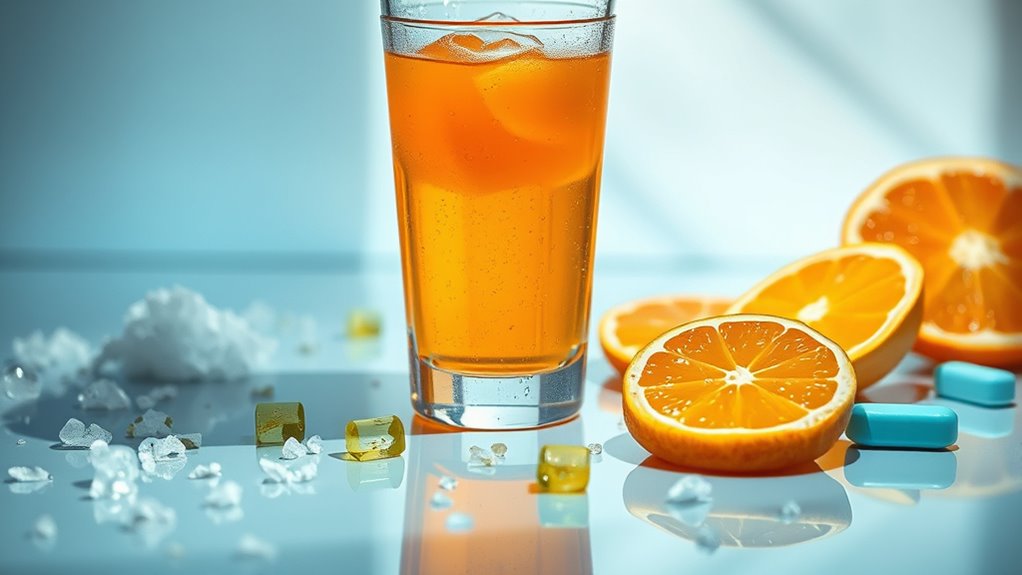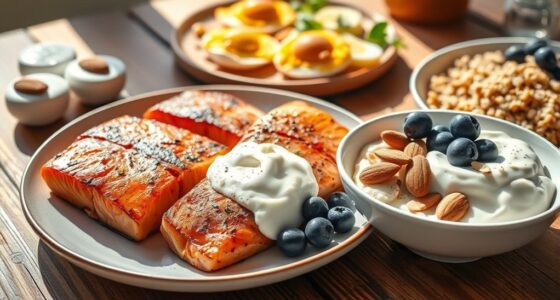Electrolytes like sodium, potassium, magnesium, and calcium are crucial minerals that support hydration, muscle function, and nerve signaling beyond just drinking water. You can get them from foods like bananas, dairy, nuts, and salt, or through drinks like coconut water and sports beverages. Balancing electrolytes is essential, especially during hot weather or exercise, but watch for signs of imbalance. Keep exploring how to optimize your hydration without relying solely on water.
Key Takeaways
- Electrolytes like sodium, potassium, magnesium, and calcium are vital for nerve function, muscle contractions, and fluid balance.
- Overhydration can cause electrolyte imbalances, leading to symptoms like cramps, dizziness, and nausea; moderation is key.
- Natural food sources and DIY drinks (e.g., coconut water, sea salt, citrus) efficiently replenish electrolytes without artificial additives.
- Flavoring electrolyte drinks with fruits, herbs, or spices enhances hydration and personal taste while maintaining electrolyte levels.
- Seek medical help if experiencing severe symptoms like confusion, muscle weakness, or chest pain to prevent serious health complications.
What Are Electrolytes and Why Do They Matter?

Electrolytes are minerals like sodium, potassium, calcium, and magnesium that carry an electric charge when dissolved in your body’s fluids. They’re essential for maintaining fluid balance, nerve function, and muscle contractions. When you hydrate, your body works to optimize electrolyte absorption, ensuring these minerals reach your cells efficiently. Hormonal regulation plays a crucial role here; hormones like aldosterone and antidiuretic hormone control how electrolytes are retained or excreted, keeping your levels balanced. Without proper electrolyte function, dehydration can worsen, leading to fatigue, cramps, or dizziness. Proper electrolyte levels are also vital for preventing dehydration and supporting overall health. Understanding why electrolytes matter helps you appreciate their role in overall hydration and health. By supporting hormonal regulation and absorption, electrolytes keep your body’s systems running smoothly.
Common Sources of Electrolytes in Foods and Drinks
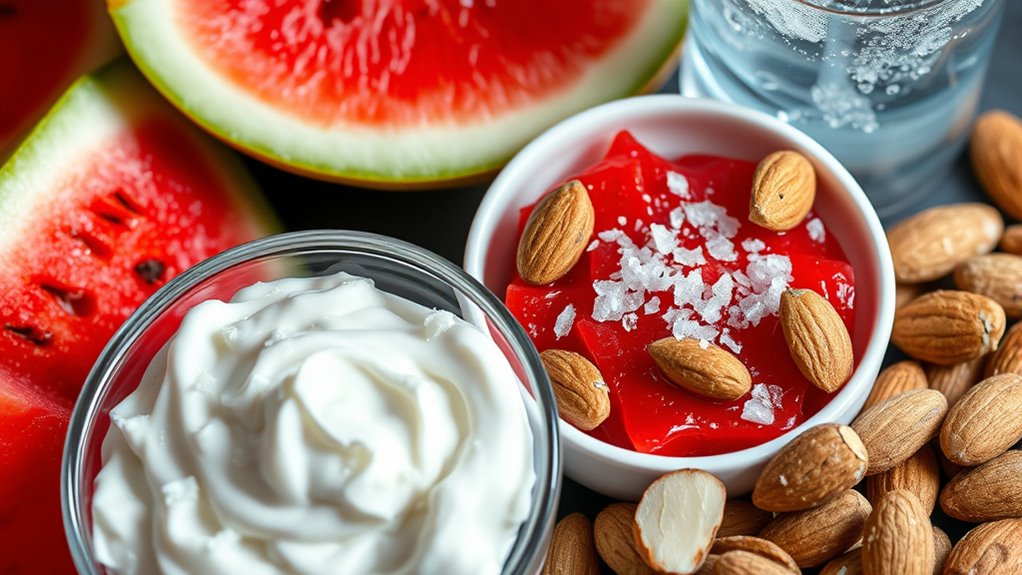
You can find electrolytes in a variety of foods and drinks that fit easily into your daily diet. Popular food sources include bananas, oranges, spinach, and potatoes, which provide potassium. Dairy products like yogurt and milk supply calcium, while nuts and seeds offer magnesium. For sodium, processed foods and table salt are common sources, but natural options like seaweed also contain it. Beverages such as sports drinks, coconut water, and electrolyte-infused waters are convenient ways to replenish electrolytes quickly. If you experience electrolyte deficiency, incorporating these food sources helps maintain balance and hydration. Including a variety of these options ensures you get essential electrolytes without relying solely on supplements, supporting your overall health and hydration needs naturally. Additionally, understanding the importance of ketosis can help optimize your electrolyte intake during low-carb or ketogenic diets.
Signs You Might Be Dehydrated or Lacking Electrolytes
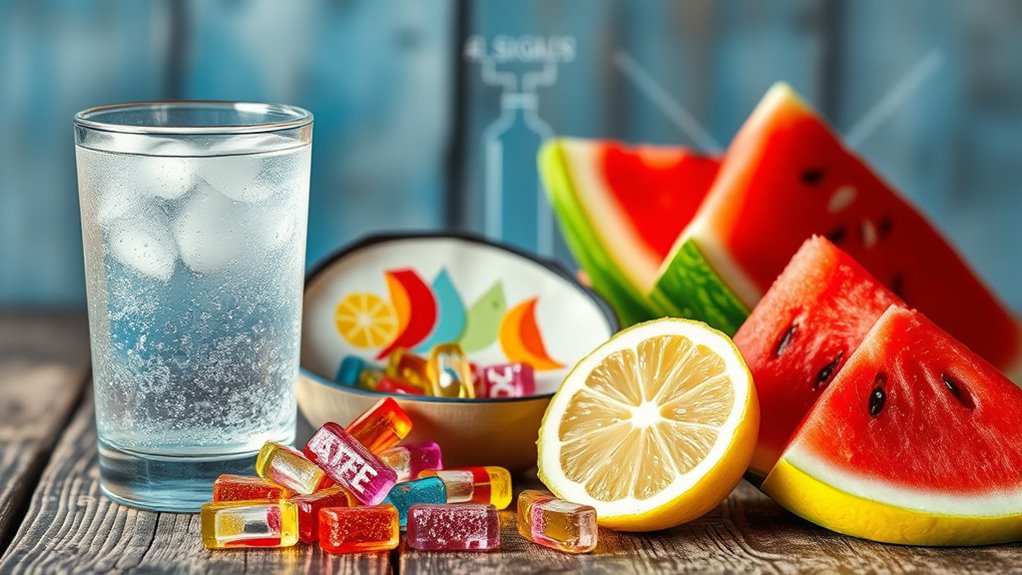
Dehydration and electrolyte imbalances often cause noticeable symptoms that can alert you to a problem. Many hydration myths suggest drinking more water is always the answer, but symptoms like muscle cramps, fatigue, or dizziness might also point to electrolyte deficiencies. Conversely, some electrolyte myths claim supplements are unnecessary, but if you experience irregular heartbeat or confusion, you could be lacking essential minerals. You may notice dark urine, dry mouth, or headaches, which signal dehydration or imbalanced electrolytes. Recognizing these signs early helps prevent more serious issues. Don’t dismiss these symptoms as minor; they’re your body’s way of telling you to check your hydration and electrolyte levels. Staying aware can ensure you address deficiencies before they escalate, especially since celebrity transformations often include improved health routines.
How Electrolytes Help Your Body During Exercise
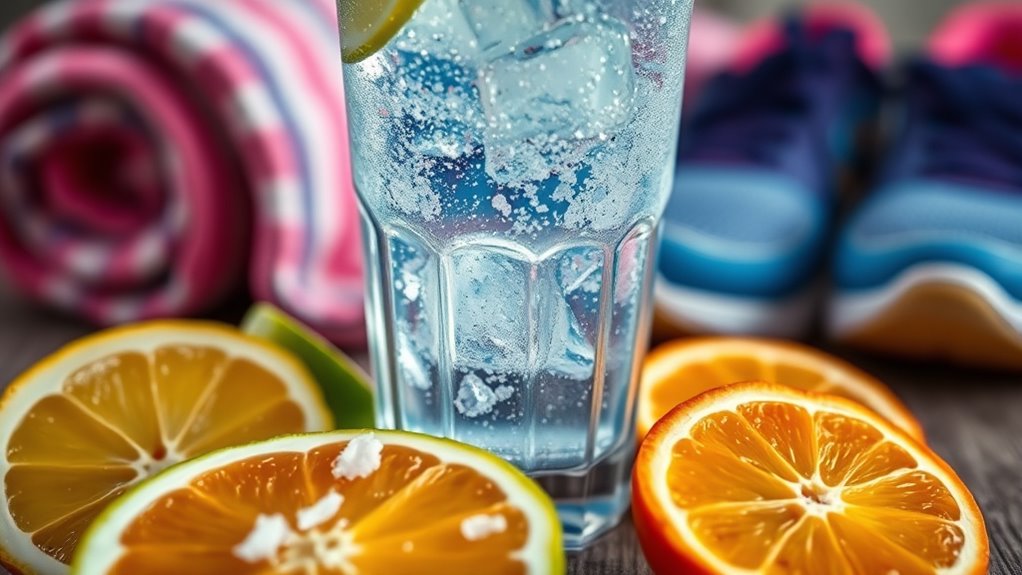
Electrolytes are essential for maintaining muscle function during exercise, helping your muscles contract smoothly. When your electrolyte levels drop, you’re more likely to experience cramping and fatigue. Keeping them balanced guarantees you stay strong and comfortable throughout your workout. Incorporating electrolyte-rich foods into your diet can also support optimal hydration and performance.
Electrolyte Balance and Muscle Function
During exercise, maintaining proper electrolyte balance is essential for muscle function and overall performance. Electrolytes like sodium, potassium, and calcium play a crucial role in muscle contraction and nerve signaling. When your electrolyte levels are balanced, signals between your nerves and muscles flow smoothly, helping you move efficiently. If levels drop, muscle contractions can become weak or uncoordinated, increasing the risk of cramps or fatigue. Proper hydration ensures electrolytes stay in ideal ranges, supporting sustained muscle activity. Without enough electrolytes, your muscles can’t respond quickly or effectively to signals, impairing your performance. Keeping a steady supply of electrolytes during exercise helps maintain the delicate balance needed for strong, controlled muscle movements and clear nerve signaling.
Preventing Cramping and Fatigue
Have you ever experienced cramps or sudden fatigue while exercising? These issues often stem from electrolyte imbalances that hinder muscle recovery and cause fatigue. To prevent this, focus on maintaining proper electrolyte levels, especially during intense workouts. Using electrolyte supplements can help replace lost minerals like sodium, potassium, and magnesium, which are essential for muscle function. When your electrolyte levels are balanced, muscle contractions stay smooth, reducing the risk of cramps. Staying hydrated with electrolyte-rich drinks supports ongoing muscle recovery and keeps energy levels high. Don’t ignore early signs of fatigue—addressing electrolyte imbalances promptly can improve endurance and comfort during exercise, helping you push through your workout without interruption. Proper electrolyte management is key to avoiding cramping and maintaining peak performance.
Comparing Sports Drinks, Coconut Water, and Homemade Electrolyte Drinks
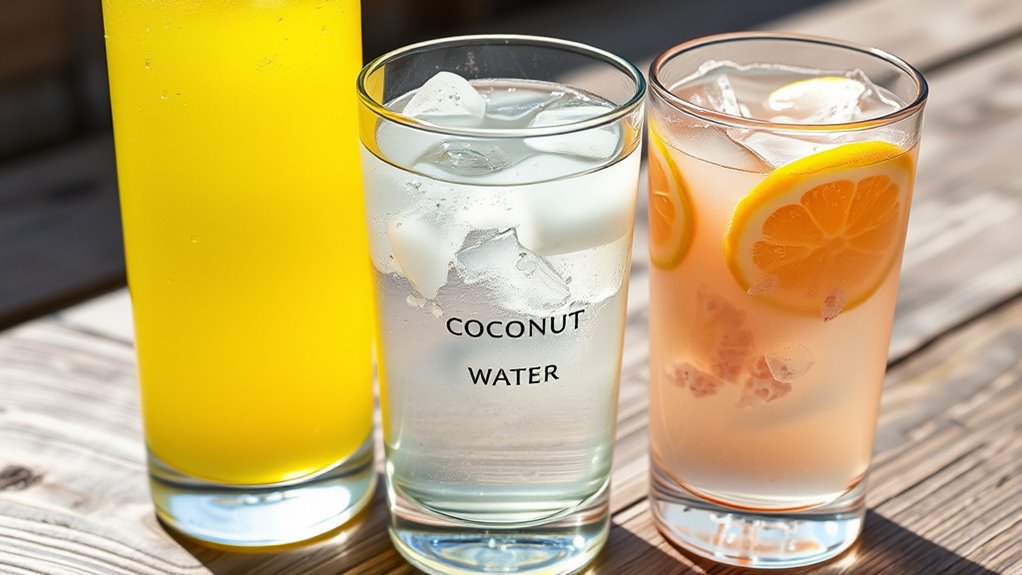
When choosing between sports drinks, coconut water, and homemade electrolyte solutions, understanding their differences can help you make the best choice for hydration. Sports drinks typically contain added sugars and electrolytes designed for quick electrolyte absorption, making them ideal during intense exercise or prolonged activity. Coconut water offers natural electrolytes like potassium and magnesium, providing steady hydration with minimal added ingredients, though absorption may be slightly slower. Homemade electrolyte drinks let you customize ingredients, balancing electrolytes and hydration timing to suit your needs. Electrolyte absorption varies among these options, so consider how quickly you need rehydration. For sustained hydration, coconut water or homemade solutions can be effective, while sports drinks are better for rapid replenishment during high-intensity activity. Additionally, understanding the role of high refresh rates in electronic displays can help you optimize your viewing or gaming experience.
Tips for Incorporating Electrolytes Into Your Daily Routine
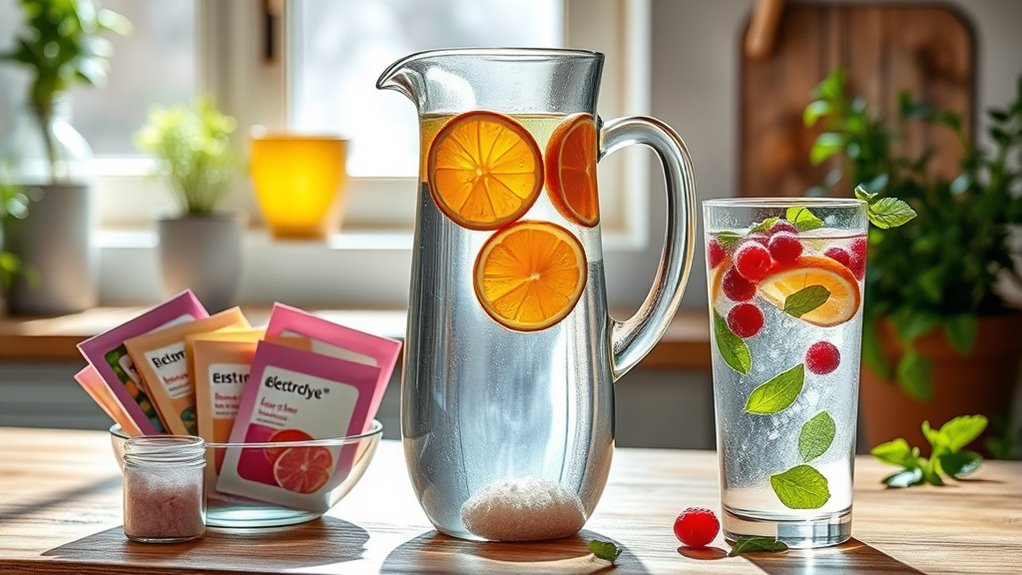
Incorporating electrolytes into your daily routine can boost hydration and support overall health, especially if you’re active or live in a hot climate. One simple way is using electrolyte supplements, which come in powders, tablets, or drinks. Add them to your water for a quick hydration boost. To stay consistent, try hydration tracking—monitor your fluid intake and electrolyte levels to identify gaps. Carry a reusable water bottle with electrolyte supplements to make hydration seamless throughout the day. Incorporate small, frequent doses rather than large amounts at once, especially during exercise or heat exposure. Electrolyte balance is essential for maintaining proper hydration and preventing issues like fatigue or dizziness. By making these adjustments, you’ll guarantee your body maintains ideal Electrolyte balance, improving hydration, energy, and recovery without overcomplicating your routine.
The Role of Sodium, Potassium, Magnesium, and Calcium
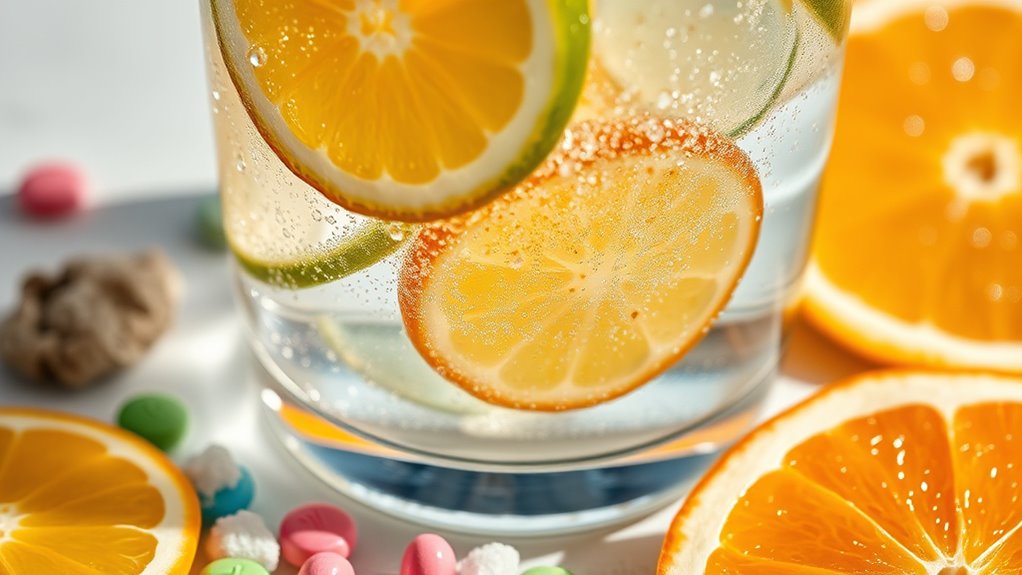
Electrolytes like sodium, potassium, magnesium, and calcium play essential roles in maintaining your body’s fluid balance and supporting various physiological functions. They help regulate electrolyte absorption, ensuring your cells function optimally. Sodium and potassium work together to sustain the sodium-potassium balance, which is crucial for nerve signaling and muscle contractions. Magnesium supports energy production and muscle relaxation, while calcium is vital for bone health and muscle function. Proper intake of these minerals helps prevent dehydration and supports overall health. When your electrolyte levels are balanced, your body can efficiently distribute fluids, maintain blood pressure, and support nerve and muscle activities. Understanding how Honda Tuning techniques can optimize vehicle performance is similarly important for achieving desired results. Focusing on these electrolytes guarantees that your hydration efforts are effective and that your body functions smoothly.
Recognizing Overhydration and Electrolyte Imbalance Risks
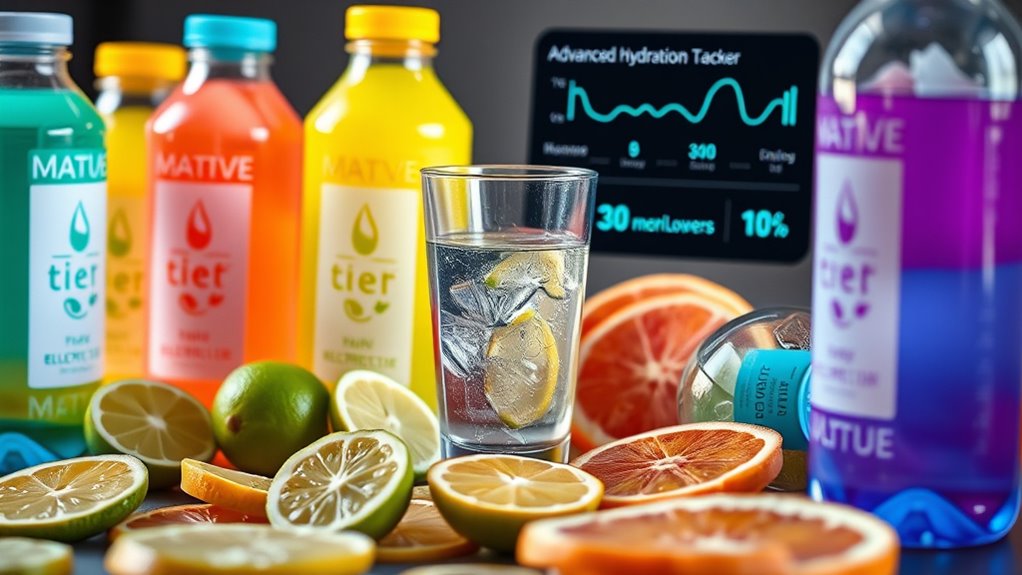
Overhydration can occur when you consume more fluids than your body can eliminate, leading to an electrolyte imbalance that disrupts normal bodily functions. This condition, known as hyponatremia, often involves a potassium deficiency, which can cause muscle weakness, cramping, and confusion. Recognizing signs of overhydration is vital—look out for headaches, nausea, swelling, and dizziness. If you suspect an electrolyte imbalance, consider electrolyte supplements to restore balance, especially if you’re engaging in prolonged exercise or hot weather. Be cautious not to overdo fluid intake, and listen to your body’s signals. Maintaining proper hydration isn’t just about drinking water; it’s about balancing electrolytes to prevent the risks associated with overhydration and guarantee your body functions smoothly. Understanding electrolyte imbalances can help you better manage hydration and avoid potential health issues.
DIY Electrolyte Recipes for Optimal Hydration
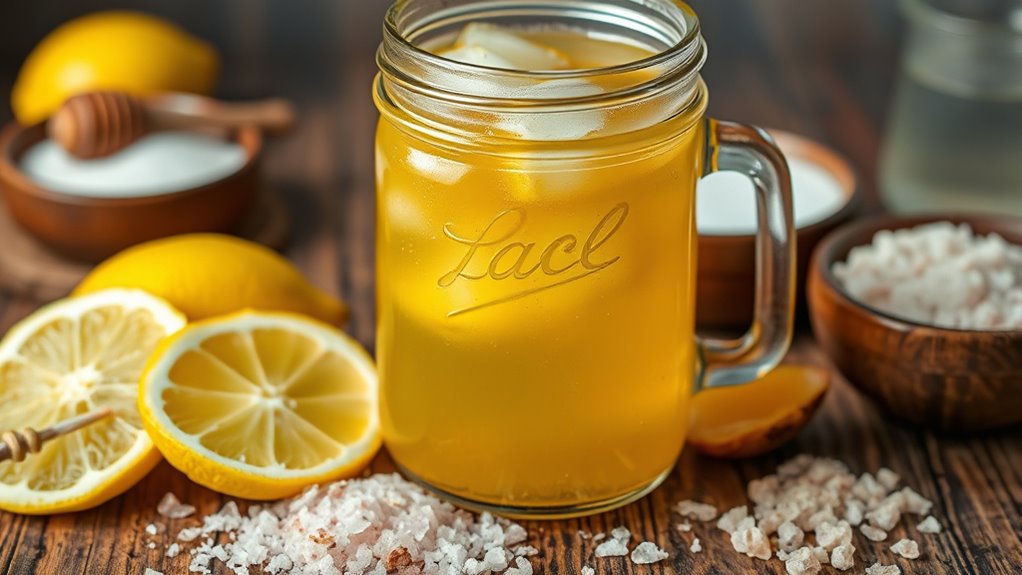
Creating your own electrolyte drinks lets you choose natural ingredients that boost hydration without artificial additives. You can experiment with flavor variations to keep your drinks interesting and tailored to your taste. Plus, there are sugar-free options to support your health goals while staying refreshed. Incorporating electrolyte balance into your recipes can further optimize hydration and recovery.
Natural Ingredient Combinations
When it comes to staying properly hydrated, using natural ingredients to make your own electrolyte drinks is an effective and healthy approach. Combining ingredients like coconut water, sea salt, honey, and citrus not only supports electrolyte absorption but also dispels common hydration myths that store-bought drinks are the only option. Coconut water naturally contains potassium and magnesium, essential for fluid balance, while sea salt provides sodium. Honey adds a touch of natural sweetness and quick energy, and citrus boosts flavor and vitamin C intake. These simple ingredient combinations help you create personalized drinks that maximize hydration without artificial additives. By choosing natural ingredients, you’re fueling your body efficiently and avoiding misconceptions about hydration needs. Automation in business advancements have also led to the development of innovative hydration solutions, making it easier to stay replenished on the go. It’s a smart way to stay refreshed and maintain ideal electrolyte levels.
Custom Flavor Variations
To make your electrolyte drinks more enjoyable and tailored to your taste, experimenting with custom flavor variations can boost your hydration routine. Flavor infusion allows you to add fresh fruits, herbs, or natural extracts to create invigorating, personalized blends. Try combining lemon and mint for a cooling effect or berry and basil for a sweet, aromatic twist. Creating custom blends gives you control over the flavor profile, making hydration more appealing and sustainable. You can also experiment with spices like ginger or cinnamon for an added kick. These simple tweaks keep your electrolyte drinks exciting, encouraging you to stay consistently hydrated. With a little creativity, you transform basic electrolyte solutions into delicious, motivating beverages perfect for any time of day.
Sugar-Free Options
Looking for a way to stay hydrated without added sugars? DIY electrolyte drinks are a great option for flavor enhancement without compromising your health. You can combine natural ingredients like lemon juice, a pinch of sea salt, and a splash of coconut water to create a invigorating, sugar-free beverage. These recipes help optimize hydration timing by providing essential electrolytes without unnecessary carbs or sweeteners. Using citrus or herbal infusions can make your drinks more appealing, encouraging you to hydrate regularly throughout the day. Plus, making your own electrolyte drinks allows you to control ingredients and avoid artificial additives. Whether you’re exercising or just staying revitalized, sugar-free options keep hydration simple, effective, and tailored to your taste.
When to Seek Medical Advice for Hydration and Electrolyte Issues
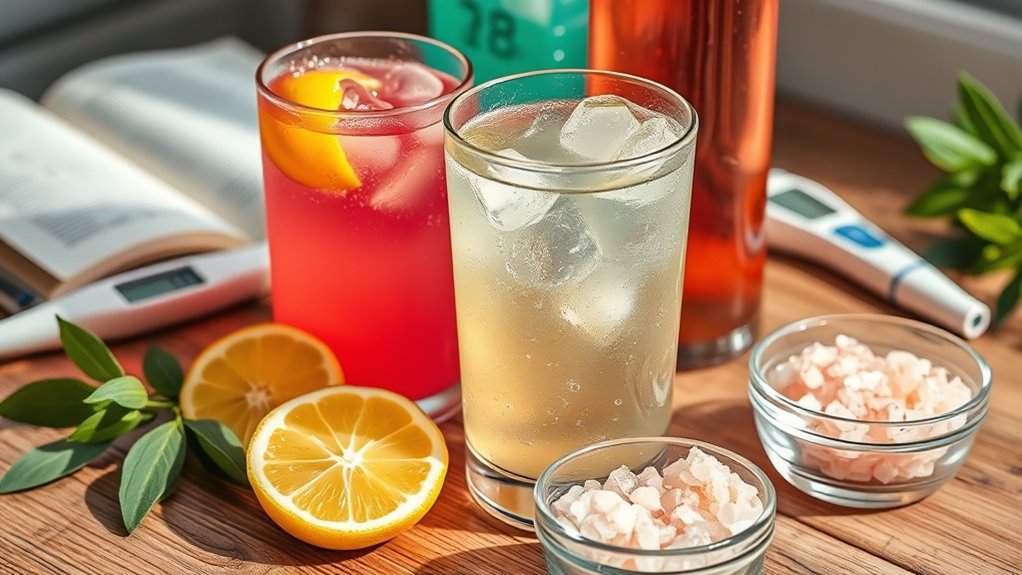
If you notice persistent symptoms such as severe dizziness, confusion, or muscle weakness, it’s crucial to seek medical advice promptly. These signs could indicate serious electrolyte imbalances or dehydration that require professional intervention. You might need electrolyte supplements or hydration therapy administered under medical supervision to restore your body’s balance. Do not ignore ongoing symptoms or if they worsen, as untreated electrolyte disturbances can lead to complications like seizures or organ issues. Trust your healthcare provider to evaluate your condition and recommend appropriate treatment. Seek help immediately if symptoms are severe or accompanied by fainting, chest pain, or difficulty breathing. Timely medical attention ensures proper electrolyte management and prevents complications, helping you recover safely and quickly.
Frequently Asked Questions
Can Electrolytes Help With Hangover Recovery?
Electrolytes can definitely help with hangover recovery by replenishing lost minerals after alcohol consumption. They support your body’s alcohol detox process and can ease common hangover symptoms like headaches, fatigue, and dizziness. Drinking electrolyte-rich drinks or sports drinks helps restore hydration levels faster than water alone. So, if you’re dealing with a hangover, boosting your electrolyte intake can make you feel better sooner and aid your overall recovery.
Are There Vegan Sources of Electrolytes?
Imagine a vibrant green smoothie or a crisp coconut water sip—these are your plant-based hydration options. Vegan electrolyte sources like bananas, spinach, and chia seeds pack potassium, magnesium, and calcium, fueling your body naturally. These foods replenish your electrolytes effortlessly, helping you stay energized and balanced. Embrace these plant-based hydration choices, and you’ll enjoy a tasty, ethical way to keep your electrolyte levels topped off every day.
How Do Electrolytes Affect Mental Focus and Alertness?
Electrolytes play a crucial role in improving your brain function and reducing fatigue, helping you stay sharp and alert. When your electrolyte balance is maintained, nerve signals transmit more efficiently, boosting mental focus. Proper electrolyte levels prevent dehydration, which often causes fatigue and sluggishness. So, by keeping your electrolytes in check, you support better concentration and mental clarity, ensuring you stay energized and alert throughout your day.
Can Chronic Electrolyte Imbalance Lead to Long-Term Health Issues?
Chronic electrolyte imbalance can cause long-term health issues if left unaddressed. When you experience long-term dehydration or electrolyte deficiency, your body struggles to maintain proper nerve and muscle function, which may lead to ongoing fatigue, heart problems, or kidney issues. You might also face persistent muscle cramps or cognitive difficulties. To prevent these risks, it’s essential to stay hydrated and maintain a balanced intake of electrolytes, especially during prolonged physical activity.
Are There Any Risks of Consuming Too Many Electrolytes Daily?
You should be cautious about consuming too many electrolytes daily because electrolyte overdose can cause serious health issues. An imbalance symptoms like nausea, irregular heartbeat, or muscle weakness might appear if you overconsume. While electrolytes are essential, excessive intake disrupts your body’s natural balance, so follow recommended amounts. Always consult a healthcare professional before making significant changes, especially if you have health conditions or take medications.
Conclusion
Staying hydrated isn’t just about drinking water; electrolytes play a vital role too. By choosing the right foods, drinks, and homemade solutions, you can maintain a healthy balance and avoid dehydration or overhydration. Think of electrolytes as the body’s electrical system—without them, your muscles and nerves can’t function properly. So, next time you’re active or feeling off, remember, a balanced electrolyte intake keeps you energized and feeling your best.
